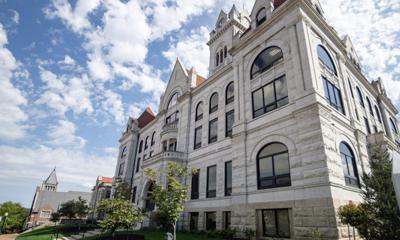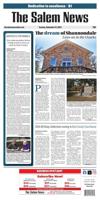In a new attack on the bill that authorized state funding for professional sports stadiums, a group of taxing districts and property owners are challenging property tax caps authorized for 97 counties in Missouri.
A lawsuit filed Friday in Cole County Circuit Court alleges state lawmakers unconstitutionally split residential property into different classes, choosing which counties would get a cap, and how much, on “simply the whim of individual legislators.”
The bill was passed by lawmakers during a special session in June.
The bill’s funding for sports stadiums — up to $1.5 billion intended to keep the Kansas City Chiefs and Royals in Missouri — was already in court. A hearing is scheduled Tuesday morning on a motion by the state to dismiss that challenge, filed by state Sen. Mike Moon, a Republican from Ash Gove, and others, alleging the bill violated procedural rules of the constitution.
Plaintiffs in the new case include a taxpayer from St. Louis County, which will not have taxes subject to the law’s caps and one from Warren County, which will have a cap that allows no growth in tax bills. The taxing districts listed in the petition are the Ozark Fire Protection District, along with school districts Warren County R-III in Warrenton, Crawford R-I in Bourbon, Ozark R-VI, Meramec Valley R-III in Pacific, Grandview R-II in Dittmer and Doniphan R-I.
The law requires each county subject to a possible cap to hold an election asking voters if they want to enact it.
Within two weeks of passing the legislation, House Speaker Jon Patterson had established an interim committee to study property taxes amid questions about the property tax provision’s constitutionality.
In 75 counties, voters could prevent property taxes from rising more than 5% per year from a base amount, or the rate of inflation, whichever is greater. In 22 other counties, voters could freeze their homes’ property taxes with exceptions for newly voted levies and additional value from improvements.
Lawmakers opted their counties into the legislation, deciding what level of relief they wanted for their area. Many legislators from the state’s largest counties asked to be excluded, leaving Boone, Greene, Jackson, St. Louis County and the city of St. Louis out of the law.
“No rational basis was used to categorize counties between those where the credit could result in a freeze on property tax revenue growth, a 5% cap on property tax revenue growth, or neither,” plaintiffs wrote in their initial filing.
Some of the school districts joining the lawsuit cover multiple counties that, if approved by voters, would have different levels of tax relief.
Their attorneys argue that this would violate Article X of the Missouri Constitution, which requires uniformity in taxation and limits state lawmakers’ power to divide real property into subclasses, among other things.
“As applied, (the law) may result in disparate treatment of otherwise similarly situated taxpayers because certain taxpayers for a single district may reside in political subdivisions that cover multiple counties — counties that may be subject to different property tax credit schemes.”
The lawsuit also challenges the statute under the state’s equal protection clause because the law only gives some taxpayers the right to vote on tax relief.
The law “mandates varying levels of tax relief — either a cap of a five percent increase or no increase — denying all other similarly situated taxpayers the same level of tax relief thereby violating their equal rights and opportunity under the law,” plaintiffs wrote.
Plaintiffs’ attorneys further label the law unconstitutional for violating a section of the state’s constitution that restricts certain local or special laws.
“A law may not include less than all who are similarly situated,” plaintiffs wrote, saying the counties are grouped without a “conceivable state of facts that connect” them.

















